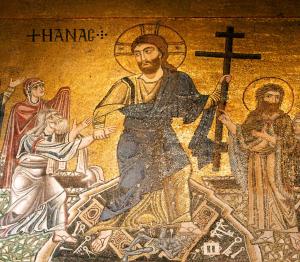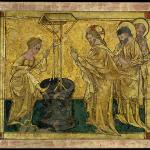
Jesus did many things in his temporal ministry from healing the sick, promoting those who have been unjustly oppressed (like the poor), to teaching everyone what God most expects of them, that is, to embrace the way of love. But we would be wrong to ignore that he also warned us of the consequences of unlove, of sin, if we continue to embrace it for perpetuity, that is, he warned us of the possibility of eternal perdition. God does not want anyone to be lost in the confines of unlove and the suffering it bring. The Son of God therefore became one of us, the God-man Jesus, so that he can meet with us where we are at, even in the midst of our unlove and the private little hell it makes for us, in order that through him we have a way out of that hell and enter into the kingdom of God.
Try as we might to ignore it, both heaven and hell factored into Jesus’ message. When talking about them, Jesus employed motifs which resonated with his immediate audience. He used those images and concepts they already knew, but he did so in a way that he could and would point beyond them as he subtly added elements which were not so traditional but rather represented the surprising new way God was at work with humanity. In his preaching, even when talking about heaven and hell, Jesus was preparing his audience, and all those who would come after and read about what he said, to open themselves up to the glory of God, to receive that glory into themselves so that they could find themselves participating in the divine life and experiencing the beatitude which flows from it.
Hell does not have to be, should not be, the final word – rather Jesus, the Logos, is the first and the last word, and so in and through him, hell itself is transcended: hell itself is bound by God, God is not bound by it. While Jesus utilized spatial imagery to represent the kingdom of God, and also hell, we must understand that such spatial imagery, as with much which he said about it, is not univocal but analogical to what we can and will experience in either of them, as George Maloney pointed out:
We have seen descriptions of heaven in the Old and New Testaments that employ spatial terms as though heaven were a place form which Christ comes and to which he and we some day will go. We realize such descriptions are merely symbolic, similar to the imagery in the Book of Revelations. Heaven is depicted as the New Jerusalem, the city of God, adorned with precious stones of diamond, crystal, agate, pearls and so forth (Rv 21:25-21). But in heaven there can be no space since there can be no extended matter. Yet there must be some localizing of individual consciousnesses and personalities. The total being of a human being and an angel, of the humanity of Christ and the glorified humanity of Mary, must be “localized” in some new experience of being in place, in being towards others.[1]
We are so accustomed to the way things exist in material, physical creation, that we need spatial analogies to help us understand the experience which we will have in eternity, when we will no longer be bound to the confines of space and time. Scripture consistently employs analogies to help us understand divine truths, such as the way it uses body parts to represent aspects of the divine nature. God, being spirit, is not physical, and is not composed of parts, let alone bodily parts, but the ways God is at work in and with the world, in and with us, sometimes is best represented as if God is using body parts, which is why Scripture will talk about the hand of God, the finger of God, the face of God, and the back of God.
We must understand each body part indicates a way God can engage us, and also, a way in which different members of the Godhead, the Trinity, can engage each other, that is, each time we hear mentioned a body part in relation to God, we are being referred to a divine energy. Scripture tells us that Jesus is at the “right hand” of God the Father, even as those who are blessed and find themselves in the kingdom of God will find themselves at the right hand of Jesus; we would be wrong to interpret such metaphors literally, because if we did, we would turn the divine nature into something which it is not, physical, creating a false vision of God, one which is bound to lead us astray. God has no physical hands, but as we use our hands to establish our will in the world, so the hands of God represent aspect of God’s will, with the right hand being seen as representing the way God work for what is good, and the left, as representing the hand which works to purify and cleanse what is defiled (because of the way ancient humans cleansed themselves, using their left hand to take care of bodily defilements). Thus, if we are welcomed to a place at the right hand of Jesus, and so at the right hand of God, we have established a good relationship with God, who uses divine power with us for our beatitude, while if we find ourselves at the left hand of Jesus, and therefore the left hand of God, it means we are engaging the hand which works for the cleansing of what is defiled, which means, we will experiencing the cleansing fire of God’s love so long as we remain defiled by sin.
The kingdom of God is wherever beatitude can be found, while hell is experienced in the midst of sin. And, insofar our sin has us deny love, and so deny God, we are unable to praise God in and through our sin. This is why it was said that those who were dead do not praise God, because the dead being mentioned are those still caught up in their sins and the hell it brings to them:
And where the kingdom of God is, there without a doubt is eternal life, and where the kingdom of the devil is, there – it is not to be doubted – are death and hell. Whoever is there cannot praise the Lord, as the prophet says: ‘The dead will not praise you, Lord, neither will all who go down into hell’ (this is doubtless the hell of sin). ‘But we,’ he says, ‘who live =’ – not to vices or to this world, namely, but to God – ‘shall praise the Lord, from this time forth and forever. For in death there is no one who is mindful of God. But in hell’ – the hell of sin – ‘who will confess’ to the Lord? There is no one. For no one, even if he professed a thousand times that he was a Christian and a monk, confesses God when he sins. No one who does the things that the Lord condemns is mindful of God, nor does he profess in a truthful way that he is the servant of one whose commandments he disdains with reckless obstinacy. [2]
Nonetheless, Jesus, in his own death, voluntarily died so that he could share with us and come with us into the hell of sin, not because he had sin, but because we did. He wanted to show us his love by his willingness to go all the way to the pit of hell for our sake, for then, when he is there with us, he can and will offer us the love and grace we need to exist that hell and follow him into glory.
God’s desire and goal is that all shall be saved. We can hope that it will take place in the eschaton, but that is what it should be, a hope. As we currently find ourselves in time, in the realm of becoming, we do not know what the final result of that becoming will be. God’s love, to be sure, is great, and that should give us reason to hope that in the end, all will indeed be well, and God’s goal will be achieved. But we have been warned of the possibility of hell, and we must take it seriously, for even if we find ourselves among the blessed, it will be because we first found ourselves in the hell of our making and we accepted God’s love and grace when we were there. Hell is real, even if it does not have the final say, which is why we can and should take Jesus seriously, even as we take seriously when he points out the possibility that all might be saved (as exemplified by the way he uses the sign of Jonah to represent himself and his ministry).
[1] George A. Maloney, SJ, The Everlasting Now (Notre Dame, IN: Ave Maria Press, 1980), 157.
[2] John Cassian, The Conferences. Trans. Boniface Ramsey, OP (New York: Newman Press, 1997), 52-3 [First Conference; Abba Moses].
Stay in touch! Like A Little Bit of Nothing on Facebook.
If you liked what you read, please consider sharing it with your friends and family!
N.B.: While I read comments to moderate them, I rarely respond to them. If I don’t respond to your comment directly, don’t assume I am unthankful for it. I appreciate it. But I want readers to feel free to ask questions, and hopefully, dialogue with each other. I have shared what I wanted to say, though some responses will get a brief reply by me, or, if I find it interesting and something I can engage fully, as the foundation for another post. I have had many posts inspired or improved upon thanks to my readers.













